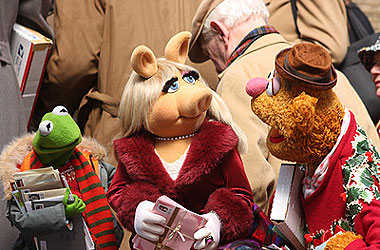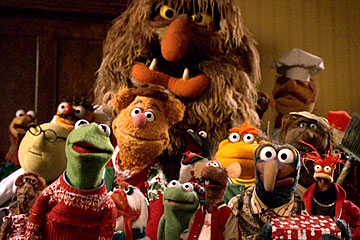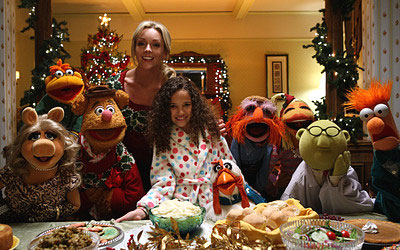| A
R T I C L E S |
New Collectibles •04/25 - Reaction Sesame Street: Big Bird and Snuffy •03/25 - NECA Sesame Street: Ernie Ultimate Action Figure, Bert Ultimate Action Figure
•03/25 - Boss Studios Fraggle Rock: Boober Action Figure, Wembley Action Figure, Mokey Action Figure, Sprocket Action Figure •08/24 - Reaction Sesame Street: Big Bird, Mr. Hooper, Sherlock Hemlock, Super Grover |
||
|
|
|

A Muppets Christmas - Letters To Santa:
An Interview with Andrew Samson, Hugh Fink and Scott Ganz
By
Phillip Chapman
December 12, 2008
 |
| Writers Scott Ganz and Andrew Samson in between scenes for "A Muppets Christmas - Letters to Santa". |
On December 17, Muppet fans will receive one of their best Christmas gifts in years. The Muppets return to prime time on NBC with the new special, "A Muppets Christmas – Letters to Santa". The television special was written by three newcomers to the Muppet scene Andrew Samson, Hugh Fink and Scott Ganz along with Muppet veteran Paul Williams.
Disney has hired the trio to write for the Muppets so it's likely we'll be seeing more projects from Andrew, Hugh and Scott in the future. They have been collaborating together for years. We had a chance to chat with these gentlemen to find out their thoughts on "Letters to Santa" and what it's like to write for the Muppets.
![]()
How did the concept for "Letters to Santa" originate?
ANDREW: It began with Paul Williams. He had the great idea to do a Christmas special about letters to Santa winding up in the hands of the Muppets. He brought that idea to Martin Baker and Muppets Studios and then we were brought in to further develop the story. Our suggestion was that it should be a journey in that we follow the Muppets as they try to deliver the lost letters to Santa at the North Pole in time for Christmas.
 |
| Writer Hugh Fink with Kermit, Miss Piggy and Gonzo on the "Letters to Santa" set. |
HUGH: Paul had already written the first song "Delivering Christmas". I remember we sat down to meet with him, and when he hummed a few bars and sang some of the lyrics, I knew we had something fantastic in store.
SCOTT: Then we sat down with Kirk Thatcher (our intrepid director) and the Muppets Studio executives and that's when things really started to come together.
What is your writing style in terms of how you see the beloved Muppet characters? Some Muppet writers walk a fine line between keeping the characters evergreen and yet adding modern touches to make a project seem "fresh". What's your philosophy?
SCOTT: As you know, each character has a very strong defining trait that makes them who they are. Gonzo is a crazy, free spirit who fears nothing. Fozzie is an inept comedian who never gives up. Piggy is an egomaniac who loves herself almost as much as she loves Kermit. As long as you stay true to these facts, then it doesn't matter how many modern touches you add. It will all grow out of their character and it will feel true.
ANDREW: Right. That's what so exciting about writing for the Muppets. Each character is so well-defined that we all feel like we know each Muppet. We know how Kermit should react, how Piggy should feel, etc. It gives us a tremendous head start in the writing process. Coming into this project, we felt the Muppets didn't need to be updated or given a fresh take. They just simply needed to be true to who they are and how they are. That's what we love about them. They remain the same and that's what gives the Muppets such a timeless quality.
 |
HUGH: Regarding adding modern touches, it was important to use celebrity cameos that are current but wouldn't seem dated a few years from now. We also avoided making pop culture references that scream out, "This was written in the Fall of 2008." Hopefully the script feels contemporary, yet timeless.
SCOTT: One thing that will help is that the celebrities don't appear as themselves, they appear as characters. Uma Thurman is a ticket agent. Nathan Lane is a TSA Officer. Whoopi Goldberg drives a cab.
ANDREW: Obviously, that's a tradition we took from "The Muppet Movie". Steve Martin is a waiter and Milton Berle sells used cars. We always find it funny when celebrities have to treat the Muppets like customers.
Now that the project is completed, what scenes in "Letters to Santa" are your favorites? Are there particular characters that you really enjoy writing for or particularly relate too?
HUGH: For me it's the scene in which Pepe and Rizzo pay a visit to Little Italy and seek the advice of Steve Schirripa and Tony Sirico from The Sopranos. The tension between the Muppets and mobsters makes me laugh, and it's very cool to watch characters from completely opposite worlds try to relate to each other.
 |
SCOTT: My favorite scene to write was a spat halfway through the movie between Kermit and Piggy, both because it's an insane honor just to be allowed to write for these characters, and because Miss Piggy is probably my favorite character to write for. She's so totally self-centered and mercurial that it gives you incredible freedom to be funny, crazy, capricious, and have it all make perfect sense. But when it comes to relating to a character, I'm going to take the predictable road and pick Fozzie. When you write comedy collaboratively, you're going to hear that your jokes aren't funny hundreds of times. So seeing Fozzie brush it off and give it another shot is a perverse sort of example to us all.
ANDREW: I like when they get to the airport and Kermit tells them they're going to have to fly to the North Pole. Pepe says to Kermit, "Okay, but do you know of an airline that flies to the North Pole? Because I don't." Right then, voila! They spot "North Pole Airlines." Obviously, that's a major story cheat, but what's great is that you can get away with that. You can even call it out. And that's what we did. After the reveal of "North Pole Airlines", Pepe looks at the camera and says, "You've got to be kidding me" and Kermit says, "How convenient... for people who want to fly to the North Pole." Basically, it's our chance to point out that we, the writers, just took a major leap and we know it.
 |
That's why I relate to Statler and Waldorf along with Pepe and Rizzo. They can comment on the story. When things get too preposterous or gag-worthy, they can call it out. That really helped this special. I mean, the last thing this world needs is another schmaltzy Christmas movie. I didn't want to write one and I definitely didn't want to make anyone sit through one, so that's why I liked writing for those four characters, because just when things were about to pass "sentimental" and drift into "schmaltzy", they were able to speak up sarcastically and keep things in check.
When the three of you wrote "Letters to Santa" along with all-around great guy Paul Williams, what role did each of you play in the writing process?
SCOTT: The four of us wrote it (Me, Andrew, Hugh and Paul), and from there, it was a collaboration between us, Kirk, Martin, the studio and the network. Then, during the table read and shoot, Kirk and the Muppet performers made so many enhancements and additions that really took it to another level. Once production started, the studio brought us on set to make the occasional suggestion or fix, but mostly we just stood there with our jaws on the floor over what an incredible job the cast and crew did putting this movie together.
ANDREW: That's what I loved about it. It was truly a team effort. Eric Jacobson lent me a copy of "Of Muppets of Men" and it seemed like it was that way on "The Muppet Show", a constant collaboration among the cast, crew and writers. Since puppetry is as creative as it is technical, it should be that way. Coming into this project, we had no experience working with puppets, but thankfully Kirk and the performers were there to guide us as to what we could and could not do, and what we could do that would drive everyone crazy. (For example, I've learned that if you're going to have Pepe pick up and put down objects, it better be worth everyone's time.)
 |
SCOTT: Also, since we had to fit within an hour time slot, this special could only be 43 minutes long. That made it a challenge to get every character involved in the story. We wanted to do more with the Electric Mayhem and all our favorites, but unfortunately, a lot of the jokes we wrote for them had to be cut for time... but hopefully they'll make it onto the DVD.
ANDREW: Time was definitely an issue in many ways when writing this script. We had to write everything quickly. We began outlining the script in mid-June and by the first week in September, we were shooting.
SCOTT: But I think it all went so smoothly because everyone knows these characters. Everyone knows what the Muppets are supposed to be, so when everyone shares that vision, you all get on the same page very quickly.
ANDREW: Everyone involved really put a lot of thought and care into every detail. Just take the costumes. Every costume is so pitch-perfect for each character. Honestly, we didn't think about what Fozzie would be wearing, but when we saw Fozzie's overly-festive Christmas sweater, we thought, "Wow, that's exactly what Fozzie would wear because he doesn't mind looking a little silly in front of people."
Even though most fans haven't seen the special, there has already been some concern that by making Santa visible on-screen and not a mystery (like in "Christmas Eve on Sesame Street"), it makes the project more targeted to children than adults. Tell us your approach towards the Muppets meeting Santa and revealing some of the holiday mystery.
ANDREW: Hah, yes, that was also a concern for us. Hopefully, there are no children reading this right now (SPOILER ALERT!), but since Santa doesn't exist in reality and the Muppets kind of do, it creates a bit of problem. But obviously, since this is a story about getting letters to Santa, we felt it would be unsatisfying not to see Santa at the end.
SCOTT: Paul's final song says it perfectly when the lyrics say that Christmas is the time of year "when magical thinking completely applies". It's the one day of the year when you can get away with (and really, when you want) a little bit of magic. But instead of making Santa's arrival sappy and heavy, Richard Griffiths really brought a fun, lighthearted (and dare I say, jolly) energy to the part.
ANDREW: Also, we felt if Santa remained a mysterious figure, it would give the story an unneeded serious, dramatic weight. By putting him on screen, it makes it more comedic, because he's not larger than the story, he's a part of the story.
HUGH: Plus, considering three Jewish guys wrote this Christmas special, we weren't overly concerned with the holiday mystery aspect. Yet it was definitely important to make this special enjoyable for adults as well as kids.
Like most of us, you grew up with the Muppets. Tell us a little how the Muppets influenced you as a child and how that impacts your writing today.
 |
SCOTT: Before I got into Monty Python or the Marx Brothers, the Muppets were the first thing I saw that really made you laugh by introducing pure chaos into a stuffy, ordinary environment. In fact, when I first started writing for the Muppets, I thought of the Marx Brothers, because the dynamic is actually pretty similar. If you go back and watch the Marx Brothers movies, all of the characters surrounding them are just as straight and corny as they can be, which only serves to showcase the Marx Brothers as the element that upsets the balance and sets everything in motion. I keep this in mind whenever we write anything for the Muppets, and I'm sure it's colored my writing of everything else to some degree. I love stories where a larger-than-life character comes in and throws everything out of whack, and writing for the Muppets has made me realize that it's probably all Jim Henson's doing.
ANDREW: "The Muppet Movie" is one of the first movies I remember seeing. My parents taped it off of television and I must've watched it a hundred times. When I saw the fork-in-the-road joke for the first time, I thought nothing would ever be funnier. I think that might've been the first time I ever recognized a "joke". Nowadays, I love "The Muppet Movie" because it's about a journey. The movie begins and ends with iconic images -- Kermit alone in his swamp and then the Muppets all together at the end of their rainbow. It's the journey that connects those two scenes, and it's also what brings the Muppets together. I keep that in mind whenever I write something-- a story is about the distance traveled-- that you want to make the audience feel as if they themselves have gone on a journey with the characters.
HUGH: As a former writer on Saturday Night Live and comedian known for being irreverent, the Muppet moment by which I was most influenced was watching Andy Kaufman's alter ego, Tony Clifton, appear on "The Fantastic Miss Piggy Show". We see Kermit in the control room watching Tony on the monitor, bombing. Kermit stares silently for a moment, then mutters, "Interesting." To this day, that scene remains one of the hippest commentaries on comedy I've ever witnessed.
Are there any other Muppet projects you are working on at this time? What do you believe is in store for the Muppets in 2009? We've seen promised revivals of the characters that didn't happen many times before, but for the first time since maybe the mid-90's there is a growing optimism that the Muppets will be in the main spotlight once again.
 |
HUGH: Not only do we share your optimism, but we also give Disney and the Muppet execs with whom we work a lot of credit for having the vision (and courage!) to shake things up by hiring us to help continue this amazing franchise.
ANDREW: We are in development on a few other projects, but at this moment, we are working on the project of getting people to watch this special. Please go to our open event Facebook page, click that you're "attending" and help spread the word by inviting all your friends.
SCOTT: We're pretty sure that good things are in store, because everyone at Muppets Studios truly cares about the Muppets. It's still, and will always be, Jim Henson's vision and we all want to preserve that.
![]()
"A Muppets Christmas - Letters to Santa" premieres Wednesday December 17 at 7 pm central, 8 pm eastern on NBC. After you watch the special be sure to stop by our discussion forum and talk about the show with Muppet fans from around the world.
| Discuss this story | E-mail news alerts |
|
|
|
home | news | collectibles | articles | forum | guides | radio | cards | help
Fan site Muppet Central created by Phillip Chapman. Updates by Muppet
Central Staff. All Muppets, Bear
Muppet Central exists to unite fans of the Muppets around the world. |